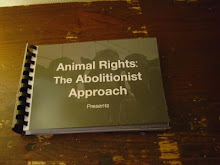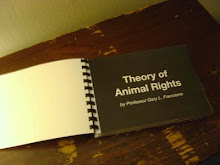Listen HERE
This week I read an essay written by Eva Batt, long standing member of the UK Vegan society. It is so well written, I am going to print it out and hand it around as part of my activism. Thanks to Nathan Schneider who has it available on his blog Vegan Abolitionist and to Randy Sandberg who added it to the text page here at Abolitionist Approach
One of the things I loved about the article was this point:
"...veganism has no connection with any political party or system, national or international. Similarly, individual vegans may be deeply religious, perhaps devout Christians or disciples of one of many other faiths and creeds in this world, but this is not a requisite of veganism, which is an everyday, fundamental way of life concerned with living without hurting others. The hereafter may, or may not, solve all our problems; but what we do now certainly affects all those around us..."
That is a wonderful statement is it not? There are many more gems like this in the article. It is worth a read or a listen, and I will be passing it along.
Enjoy!
Cool! - as I was uploading the audio, I watched Episode 7 of The Vegan News hosted by Adam Kochanowicz, and the show featured this very same article! Check out the coverage at Vegan FM
UPDATE: Professor Roger Yates left the following comment, and we were trying to get the links to become hyperlinks but I can't figure that out in the comments section either so I am posting the comment here, so you can access the links here:
Hi Elizabeth,
There are a couple of things I’d like to say on this important issue. First, we should remember that we are also vegan pioneers but in different and better circumstances. For example, we have the advantages of the internet and need never feel as isolated as the first vegans probably often did. Being a vegan is easier now than in the 1940s and 1950s (even compared to the 1970s when I became vegan). However, some new vegans are going to find it harder than others and we should help these new pioneers as much as possible, for mainstream animal advocacy neglects the fact that there is a vegan moral baseline to animal rights advocacy.
This brings me to the second point: what are we campaigning for. It seems to me that campaigning to grow the ethical vegan community (the surest means by which we can help other animals at this time) is campaigning for what we WANT as opposed to campaigning for what we DO NOT WANT in the name of politics, or pragmatics, or ‘living in the real world.’
For example, look at this 3-min video (just released this very week) about a cage-free system: http://www.worldpoultry.net/news/video-special-layer-aviary-system-4066.html Do we want to campaign FOR this sort of thing as many do, or do we want to campaign against by growing the numbers of ethical vegans?
Look at the pictures here: http://www.ciwf.ie/farminfo/farmfacts_egghens.html We could say, ‘spot the difference,’ but the picture on the left is an ‘enriched’ battery cage and the other is a standard one. The first will probably have a perch in the back and maybe some ‘nesting material.’ Leaving aside the issue of who is going to monitor this new way of regulating atrocities, do we want to campaign FOR this sort of thing as many do, or do we want to campaign against by increasing the numbers of ethical vegans until we have enough numbers to make some real changes for nonhuman animals?
The real question is where do we put our energy, commitment, time and money. Do we concentrate on what we actually want, or on something else - which we then have to campaign against anew later on. The advocates of ‘cage-free’ (or one big horrible cage) must assume that, later, they will be campaigning against the system they helped to put in place in the first place.
Roger Yates
Friday, July 3, 2009
Subscribe to:
Post Comments (Atom)











Hi Elizabeth,
ReplyDeleteThere are a couple of things I’d like to say on this important issue. First, we should remember that we are also vegan pioneers but in different and better circumstances. For example, we have the advantages of the internet and need never feel as isolated as the first vegans probably often did. Being a vegan is easier now than in the 1940s and 1950s (even compared to the 1970s when I became vegan). However, some new vegans are going to find it harder than others and we should help these new pioneers as much as possible, for mainstream animal advocacy neglects the fact that there is a vegan moral baseline to animal rights advocacy.
This brings me to the second point: what are we campaigning for. It seems to me that campaigning to grow the ethical vegan community (the surest means by which we can help other animals at this time) is campaigning for what we WANT as opposed to campaigning for what we DO NOT WANT in the name of politics, or pragmatics, or ‘living in the real world.’
For example, look at this 3-min video (just released this very week) about a cage-free system: http://www.worldpoultry.net/news/video-special-layer-aviary-system-4066.html Do we want to campaign FOR this sort of thing as many do, or do we want to campaign against by growing the numbers of ethical vegans?
Look at the pictures here: http://www.ciwf.ie/farminfo/farmfacts_egghens.html We could say, ‘spot the difference,’ but the picture on the left is an ‘enriched’ battery cage and the other is a standard one. The first will probably have a perch in the back and maybe some ‘nesting material.’ Leaving aside the issue of who is going to monitor this new way of regulating atrocities, do we want to campaign FOR this sort of thing as many do, or do we want to campaign against by increasing the numbers of ethical vegans until we have enough numbers to make some real changes for nonhuman animals?
The real question is where do we put our energy, commitment, time and money. Do we concentrate on what we actually want, or on something else - which we then have to campaign against anew later on. The advocates of ‘cage-free’ (or one big horrible cage) must assume that, later, they will be campaigning against the system they helped to put in place in the first place.
Roger Yates
The above comment was entered by Professor Roger Yates, whose computer was being iffy so I pasted the comment in for him. Thanks Roger!
ReplyDeleteIt's interesting to think that welfare advocates would even consider the possibility of having to campaign later on. Perhaps they are planning on social collapse, followed by some enlightenment period? If this is so, Mr. Yates, you propose something quite startling.
ReplyDeleteExcellent podcast, Elizabeth. It was my first time listening and now I'm enjoying going back to listen to your previous shows and interviews.
ReplyDeleteI agree with what Professor Yates wrote, as well. It seems that we have all kinds of people pouring so much time and energy into incremental changes that are only detrimental in the long run, not just because they use up resources that could be better used for more effective work (e.g. vegan education), but because they merely end up leaving people more comfortable about continuing to eat animals.
Hi thanks for listening! That is so true, and not only that, they are going backwards in another way, because in the next "incremental step" they will end up fighting THEMSELVES and their own campaigns! It is, as Anthony De Mello says, like trying to "fight darkness with your hands.."
ReplyDeleteTurn on the light!
Elizabeth, Your reading of Eva's essay was so beautiful. I think you captured the essence of it so perfectly and I really enjoyed listening to you read it. Thanks for sharing that with us!
ReplyDelete